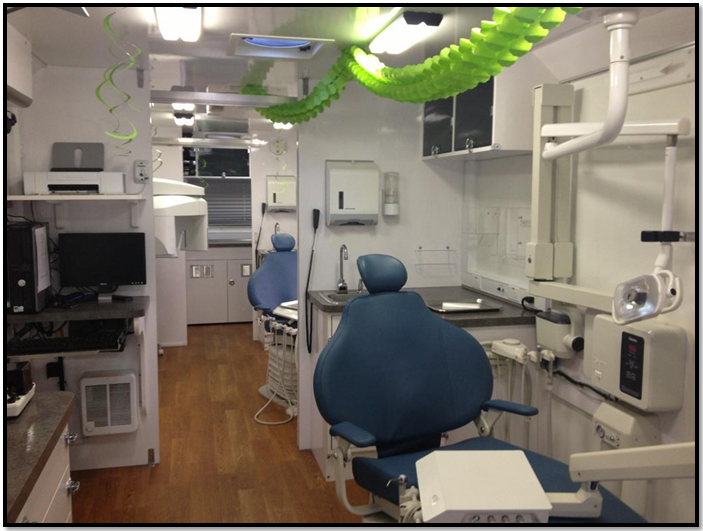A Mobile Health Clinic is essentially a doctor's office and clinic on wheels. A specially outfitted truck provides examination rooms, laboratory services, and special medical tests to those in remote areas who have access to little or no medical facilities, and to patients who do not have the resources to travel to obtain care.
Why is this important to your community?
While the CONNECT region contains an extensive supply of health care providers and facilities, these resources are not well distributed throughout the region. All of the CONNECT counties, with the exception of Mecklenburg County, have a lower concentration of physicians when compared to NC/SC averages. In particular, the ten surrounding “outer” counties have generally lower overall health status outcomes than the “inner” counties. Yet, each of the 14 CONNECT counties has medically underserved areas – areas characterized by too few primary care providers, high infant mortality rates, high poverty, and/or high elderly population. While poverty does not directly cause poor health, it is associated with a number of quality of life factors that indirectly reduce access to health care services, the adoption of a healthy lifestyle, and access to healthy, stress-free environments. The prevalence of chronic health conditions—including heart disease, stroke, pneumonia, COPD, and complications from diabetes—in the region’s outer counties requires solutions that make it easier for residents to obtain the preventative health care services they need. A Mobile Health Clinic can be part of those solutions. Counties with relatively low health risk behavior rates have lower than average unemployment and poverty levels and higher than average education and household income levels.
Skip directly to
How Does It Work?
Resources
Using the Tool
Partners
Where Has It Worked?
Where is it appropriate to use?
- Institutions
What priorities does it address?
What other tools are related?
How does it work?
Mobile health clinics have emerged over the last few decades as a cost-effective tool to address the health and wellness needs of underserved populations. Mobile health clinics are becoming more common across the nation with 1,500 to 2,000 operating nationwide. Many exist as independent entities, while others are operated by hospitals, community health centers, or academic medical centers. They can be particularly effective in areas where residents lack easy access to primary care services or are not likely to visit a doctor in a traditional setting. Local policy can identify designated locations for mobile health clinics. Common services include primary care, preventative services, and dental care. Several studies have quantified the annual cost savings of preventing emergency room visits, while providing preventative services through mobile health clinics. The Mobile Health Map project reports an average return on investment of $19 for every dollar spent on mobile clinics.
Resources
- Public Health Disparities Assessment and Identification for Action For the CONNECT Our Future Region (link)
- Mobile Health Map
- Medically underserved areas
- Health Resources and Services Administration (HRSA)
- Mobile Health Clinics Association
Ready to get started?
Using the Tool
- Create a work group that includes healthcare providers to identify medically underserved areas/populations and develop recommendations to begin or expand the type and scope of mobile clinics that are appropriate for the community. This tool requires a strong partnership between local health or other departments and health and wellness providers. There is a large network of successful mobile health providers, including examples in the region, who should be consulted at this stage.
- Understand the demographics and social characteristics of the community the health clinic will serve and consider the alternative approaches to setting up a mobile clinic. There are a few different operational arrangements:
- Provider based clinics are owned and operated as part of a hospital, nursing home, or other health agency, such as a public health department.
- Independent clinics are owned by an entity other than ahospital, for example an individual physician or community non-profit.
- Apply for grants (as needed) to fund start-up costs and seed operating costs.
- Integrate recommendations into the municipality’s community services, education, and emergency response planning. Start with grant opportunities listed on the Mobile Health Clinics Association.
- Provide policy and educational/marketing support of the community health resources available to residents, including making community members aware of the services mobile health clinics provide.
- Monitor and evaluate utilization, outcomes, health indicators and changes in the community’s health status.
Partners
- Advocacy Groups
- Colleges and Universities
- Community Service Providers
Where has it worked?
Cabarrus Health Alliance Mobile Dental Clinic - Kannapolis, NC
About the Program
The Cabarrus Mobile Dental Clinic travels to schools throughout the county to offer preventive and restorative dental treatment to children. Through the mobile van services, the clinic is able to reduce the incidence of dental cavities in school aged children and provides dental screening and referrals for preschool aged children. Education about oral health is provided to children, parents, teachers, and childcare providers. A recent grant from the Cannon Foundation is allowing the mobile clinic to increase the number of schools participating to 35 and cover the cost of equipment and operating expenses for the next several years.
Why it works
The Mobile Dental Clinic has a defined focus, to improve access to dental services for Cabarrus County children, and operates through its partnerships with schools. Director Janie Woodie noted that dental health is one predictor of student success in the classroom, and that a child suffering from dental pain can have a difficult time focusing on classroom learning. The program has been operating successfully for several years in elementary schools and is now able to expand to serve middle and high-school students throughout the county.
http://www.caromonthealth.org/news/caromont-health-unveils-mobile-wellness-coach/
http://www.cabarrushealth.org/103/Dental
“Cannon Foundation funds dental services for children” http://www.independenttribune.com/news/cannon-foundation-funds-dental-services-for-children/article_2e2126cc-fd5d-11e3-b6fb-001a4bcf6878.html
- Colleges and Universities



